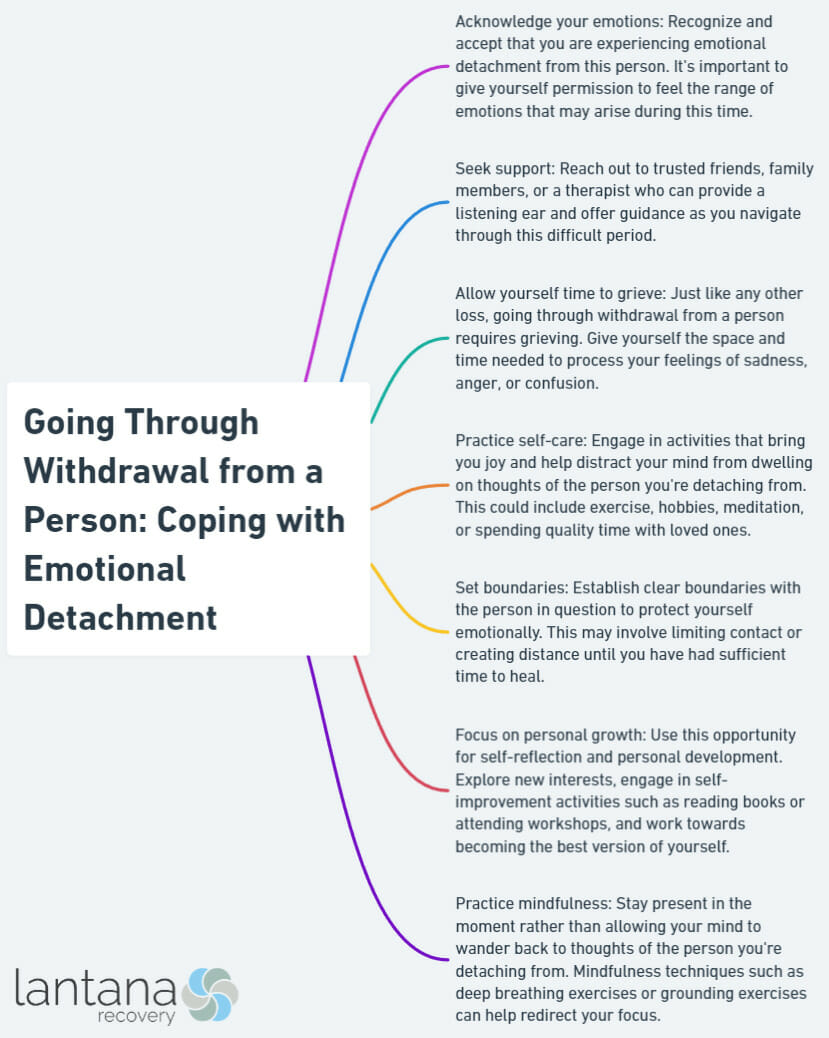Emotional detachment, also known as emotional withdrawal, refers to a state of disconnection or separation from one’s emotions, often leading to a sense of numbness or indifference. Going through withdrawal from a person can be an emotionally challenging experience, as it involves detaching oneself from the emotional bonds and connections formed with that individual. Understanding emotional attachment and detachment is essential in coping with the process.
Emotional detachment can have significant effects on relationships, causing distance and strain. Various causes contribute to emotional detachment, including past trauma, fear of vulnerability, or learned behavior. Coping with emotional detachment requires self-awareness and active steps towards healing. Recognizing and accepting one’s emotions, seeking professional help, building a supportive network, and practicing self-care and self-compassion are important coping strategies.
Dealing with the withdrawal process involves managing feelings of loneliness and isolation and developing healthy coping mechanisms. Eventually, rebuilding and moving forward entails rebuilding self-identity and self-worth, cultivating healthy relationships, and setting boundaries and prioritizing self-care.

What is Emotional Detachment?
Emotional detachment is a state in which individuals disconnect or withdraw themselves emotionally from others. It is characterized by a lack of emotional responsiveness, indifference, or an inability to connect on an emotional level. People experiencing emotional detachment may exhibit traits of being distant, cold, or uninterested in forming deep emotional connections.
Emotional detachment can manifest in various ways, including avoiding close relationships or isolating oneself socially. Individuals dealing with emotional detachment may struggle to express or share their feelings, resulting in a sense of emotional emptiness or numbness.
Hence, it is important to recognize that emotional detachment is not always a conscious choice. It can develop as a coping mechanism in response to past traumas, high stress levels, or as a form of self-protection in challenging situations. Nevertheless, emotional detachment can also indicate underlying mental health issues, such as depression or anxiety.
Understanding the concept of emotional detachment is crucial for providing support and empathy to those who are going through it. Creating a safe and non-judgmental environment for open communication and encouraging professional help, if necessary, are essential. Developing healthy coping mechanisms, seeking therapy or counseling, and cultivating self-awareness are all beneficial for improving emotional well-being in individuals dealing with emotional detachment.
What are the Signs of Emotional Detachment?
Emotional detachment can have different signs, and recognizing them is crucial. What are the Signs of Emotional Detachment? Some signs include a lack of emotional responsiveness, difficulty connecting on an emotional level, and avoiding or dismissing emotions. Emotional detachment can also lead to poor listening skills, difficulty expressing emotions, and bottling up emotions.
Another sign is avoiding physical contact and intimacy, and wanting emotional distance from others. Emotional detachment can cause extreme sadness or emptiness, which can be hard for others to understand.
It’s important to note that emotional detachment can stem from psychological conditions or unhealthy coping mechanisms. It is not a temporary situation but a behavior pattern that greatly affects social and emotional well-being.
Pro-tip: If you or someone you know shows signs of emotional detachment, seek help from a mental health professional. They can guide and support you in addressing and managing emotional detachment, developing healthier coping mechanisms, and improving emotional well-being.
If you interested in the side-effects of frequent psilocybin use, refer to our article on mushrooms withdrawal symptoms for more information.

Understanding Emotional Attachment and Detachment
Emotional attachment and detachment greatly impact our well-being and interpersonal connections. The level of emotional attachment varies depending on the depth of our relationship and the emotions involved. Understanding these concepts helps us navigate our emotions and maintain healthy relationships.
Emotional attachment is a strong bond or connection towards another person. It is characterized by love, care, trust, and dependency. Emotional attachment enhances well-being and provides security and support. Emotional detachment is a reduced emotional connection or a sense of distance from someone. It may occur due to unresolved conflicts, emotional exhaustion, or self-preservation.
Emotional detachment leads to numbness, indifference, or avoidance in relationships. Understanding emotional attachment and detachment helps navigate relationship dynamics. Here are some suggestions:
- Cultivate self-awareness: Reflect on emotional needs and identify attachment patterns in relationships.
- Maintain open communication: Express emotions and discuss attachment concerns with loved ones.
- Seek professional help if needed: Reach out to a therapist or counselor for guidance and support with emotional attachment or detachment.
- Practice self-care: Take care emotionally, mentally, and physically for a healthy level of attachment and detachment in relationships.
- Allow space for personal growth: Recognize that emotional attachment and detachment can evolve over time with changes in individuals and relationships.
By understanding emotional attachment and detachment, we foster healthier relationships and promote emotional well-being for ourselves and those around us.
How Does Emotional Detachment Affect Relationships?
Emotional detachment significantly impacts relationships. How Does Emotional Detachment Affect Relationships? It affects relationships in the following ways:
- Difficulty creating or maintaining personal relationships: Emotionally detached people struggle to connect with others on an emotional level, making it challenging to form and sustain intimate relationships.
- Difficulty opening up: Emotional detachment leads to a reluctance to share emotions or feelings, creating a barrier between individuals and hindering genuine understanding and connection.
- Lack of emotional support: Emotional detachment results in a lack of emotional attention and support for partners or loved ones, leaving them feeling neglected or unheard.
- Inability to fully engage: Emotionally detached individuals struggle to fully engage with others and share in their experiences, leading to a sense of disconnection and frustration in the relationship.
- Difficulty empathizing: Emotional detachment impairs one’s ability to understand and relate to the emotions and experiences of others, making it challenging to provide emotional support and understanding.
To address these challenges and improve relationships affected by emotional detachment, seeking professional help like seeing a mental health professional or engaging with support groups is important. Additionally, setting boundaries, practicing self-care, and working on emotional development can contribute to building healthier and more fulfilling relationships.
Apart from affecting the intimate relationships, emotional detachment can significantly elevate the risk of drug abuse as it creates a fertile ground for the development of harmful coping mechanisms. When individuals disconnect from their emotions or suppress them due to trauma, stress, or unresolved issues, they often seek solace in substances like drugs to numb their pain and fill the emotional void.
According to a clinical study by University of Texas, ” More initial emotional detachment was associated with increases in other illicit substance use. Earlier ages of first use of alcohol, marijuana, and tobacco had indirect effects on initial use of other illicit substances through initial emotional detachment.” (Detachment, peer pressure, and age of first substance use as gateways to later substance use, Gallegos et al., 2020)
What are the Causes of Emotional Detachment?
Emotional detachment can have various causes. Identifying and addressing these causes is crucial. Some common ones include:
- Unhealthy Coping Mechanisms: Using unhealthy methods to deal with difficult situations, such as stuffing emotions, bottling up emotions, or resorting to substance abuse.
- Past Trauma: Traumatic experiences like abuse or neglect can lead to emotional detachment as a self-protective measure against further pain or vulnerability.
- Lack of Trust: Trust issues arising from betrayal or broken relationships can make it difficult to form deep emotional connections with others.
- Mental Health Conditions: Certain disorders like attachment disorder or reactive attachment disorder can hinder a person’s ability to form healthy attachments and bonds.
- Difficulty Expressing Emotions: Some people struggle with identifying and expressing their emotions, which can impede their ability to connect emotionally with others.
- Learned Behavior: Emotional detachment can be learned, especially if individuals have grown up in environments that discouraged emotional expression or emphasized self-reliance.
- Fear of Rejection: The fear of rejection or social ostracism can lead to emotional withdrawal and a diminished ability to connect with others.
It’s important to note that emotional detachment is a complex issue, and the causes can vary from person to person. Seeking professional help from a mental health professional or joining support groups can offer valuable guidance and support in addressing emotional detachment.

Recognizing and Accepting the Emotions
Recognizing and accepting emotions is crucial for healing and moving on from emotional detachment. Confronting these feelings may be difficult, but it’s essential for emotional well-being.
- Allow yourself to feel: Give yourself permission to experience a range of emotions, such as sadness, anger, or confusion. Suppressing these feelings can prolong the healing process.
- Identify and label emotions: Take the time to recognize and name the emotions you are experiencing. This can help you understand your emotional state and deal with them more effectively.
- Seek support: Reach out to friends, family, or a therapist who can listen and offer guidance during this difficult time. Sharing your feelings with others can provide validation and comfort.
- Practice self-compassion: Be kind to yourself and understand that it’s okay to feel the way you do. Treat yourself with the same empathy you would show a loved one in a similar situation.
- Find healthy coping mechanisms: Engage in activities that bring you joy and help you relax, such as hobbies, exercise, meditation, or spending time in nature. Instead of indulging in unhealthy coping mechanism like drugs that can often lead to substance abuse, we recommend exploring healthier coping strategies can help you manage your emotions effectively.
Remember, recognizing and accepting your emotions is essential for healing. It allows you to process and navigate through your feelings in a healthy way, leading to personal growth and resilience.
Seeking Professional Help
Seeking professional help is crucial for coping with emotional detachment. It is important to engage in therapy with a licensed therapist or counselor. Therapy provides a safe space to explore emotions and work through challenges. Therapists offer insights and tools to develop healthier coping mechanisms.
Another suggestion is to join support groups with others who have experienced emotional detachment. Sharing experiences and learning from others who have successfully overcome emotional detachment can be empowering.
Consulting with a psychiatrist or psychologist, especially for severe emotional detachment, is also recommended. They can assess your mental health and provide appropriate diagnosis and treatment options.
In addition, it is helpful to utilize reputable online resources for information and self-help materials. You should ensure the credibility of online sources to avoid misinformation.
It is important to remember that seeking professional help is not a sign of weakness, but a proactive step towards healing and growth. With the right support, you can successfully navigate through emotional detachment and cultivate healthier emotional connections.

Building a Supportive Network
Building a supportive network is crucial during emotional detachment. A strong support system, which includes building a supportive network, offers comfort, understanding, and guidance. Here are steps to help you build a supportive network:
- Reach out to friends and family: Lean on loved ones for support. Share your feelings and thoughts with trusted individuals who can listen and provide emotional support. Building a supportive network involves reaching out to friends and family for comfort and understanding.
- Join a support group: Look for local or online groups catering to people with similar experiences. Connecting with others who understand can be beneficial. Joining a support group is an effective way to build a supportive network of individuals who can provide the necessary emotional support.
- Cultivate new friendships: Meet new people who share your interests or hobbies. Join clubs or organizations to connect with potential members of your support network. Cultivating new friendships is an important aspect of building a supportive network.
- Seek professional help: Consider therapy or counseling from a qualified mental health professional. They can offer guidance and support as you navigate your emotions and detachment. Seeking professional help is a valuable step in building a network of professionals who can provide the necessary assistance.
- Utilize online resources: Explore online communities, forums, or social media groups dedicated to emotional detachment or coping with difficult relationships. These platforms provide a space to connect with others and gain insights. Utilizing online resources is a modern way to build a supportive network and connect with individuals who share similar experiences.
Building a supportive network takes time and effort but greatly enhances well-being and fosters personal growth. Remember, everyone’s journey is unique, so find the strategies that work best for you in your quest for emotional healing. Building a supportive network is an essential aspect of this journey.
Practicing Self-Care and Self-Compassion
When going through withdrawal from a person, it’s crucial to focus on practicing self-care and self-compassion. In this section, we will explore various ways to rebuild our self-identity and self-worth, cultivate healthy relationships, and set boundaries to prioritize our own well-being. By incorporating these strategies into our lives, we can navigate the emotional detachment process with more resilience and promote personal growth. Remember, taking care of ourselves is the first step towards healing and finding happiness again.
Dealing with the Withdrawal Process
Much like the intense cravings and discomfort experienced during drug or stimulant withdrawal, severing ties with someone can also lead to emotional withdrawal, leaving a void that yearns for their presence. Feeling the withdrawal from a person can be tough, but there are ways to cope with emotional detachment. In this section, we’ll explore how to manage feelings of loneliness and isolation, as well as develop healthy coping mechanisms. Let’s dive in and discover effective strategies to navigate through the challenging withdrawal process.
How to Manage Feelings of Loneliness and Isolation
Managing feelings of loneliness and isolation can be a challenge, but there are strategies that can help. Here are some ways on how to manage feelings of loneliness and isolation:
- Recognize and acknowledge your emotions: It’s important to acknowledge and accept the feelings of loneliness and isolation. By doing so, you can begin to address them.
- Build a supportive network: Reach out to friends, family, or support groups who can listen and understand. Having a supportive network can alleviate loneliness and provide a sense of connection.
- Practice self-care and self-compassion: Engage in activities that bring you joy and take care of your physical and emotional well-being. This can include exercising, pursuing hobbies, or using relaxation techniques. Remember to treat yourself with kindness and compassion during this time.
- Develop healthy coping mechanisms: Find healthy ways to cope with loneliness and isolation. This may involve journaling, practicing mindfulness, or exploring creative outlets. It’s important to avoid unhealthy habits such as excessive alcohol consumption or isolating yourself.
- Seek professional help if necessary: If your feelings of loneliness and isolation persist or become overwhelming, consider reaching out to a mental health professional. They can provide guidance, support, and help navigate this challenging emotional state.
Remember, managing feelings of loneliness and isolation takes time. Be patient with yourself and know that seeking support is a sign of strength.
Developing Healthy Coping Mechanisms
When dealing with emotional detachment, it is essential to develop healthy coping mechanisms for emotional well-being and personal growth. Here are some strategies to cultivate:
- Practice self-awareness: Reflect on your emotions and understand triggers. This can help identify patterns and develop management strategies.
- Engage in self-care activities: Prioritize activities that bring joy and help relaxation, such as exercising, practicing mindfulness, or indulging in hobbies. Self-care is crucial for maintaining emotional balance.
- Seek support: Reach out to trusted friends or family or join support groups. Consider seeking professional help from therapists or counselors who specialize in emotional well-being.
- Express emotions in healthy ways: Find outlets like journaling, art, or talking to a therapist. Avoid bottling up emotions as it can lead to increased distress.
- Learn effective communication skills: Develop the ability to express thoughts and emotions openly and honestly. Practice active listening and understanding others’ perspectives to enhance interpersonal relationships.
Remember, developing healthy coping mechanisms is a process that takes time and practice. Be patient as you navigate through emotional detachment and seek support when needed.
Rebuilding and Moving Forward
After facing the painful experience of emotional detachment, it becomes crucial to focus on rebuilding and moving forward. In this section, we will explore key steps to help you navigate this journey. From rebuilding your self-identity and self-worth, to cultivating healthy relationships and setting boundaries, we will provide insights and strategies to help you prioritize self-care and regain control of your life. It’s time to embrace healing and embark on a transformative path towards a brighter future.
Rebuilding Self-Identity and Self-Worth
Rebuilding self-identity and self-worth is crucial for dealing with emotional detachment. It is important to take steps towards rediscovering your sense of self and recognizing your value as an individual.
- Take the time to reflect on your interests and strengths: Explore the things that truly bring you joy and engage in activities that help you reconnect with your passions. This will not only boost your self-confidence but also remind you of your unique capabilities.
- It is essential to set realistic goals: Start by setting small, achievable goals. Accomplishing these goals will help you rebuild your self-esteem and provide you with a sense of purpose and direction in life.
- Practice self-compassion: Treat yourself with kindness and gentleness. Be understanding and engage in self-care activities such as exercising, practicing mindfulness, and reflecting on your thoughts and emotions. In 2018, a group of psychological experts examined the role of self-compassion and its relationship with attachment among 74 patients diagnosed with clinical depression and anxiety. The study reported that recognizing the significance of self-compassion is crucial, both in theory and real-world situations, for understanding why people with high attachment avoidance might experience psychological distress. This study backs the idea of using therapeutic techniques like compassion-focused therapy, which is becoming increasingly supported by research evidence, to help these individuals.
- Surround yourself with a network of supportive individuals: Build relationships with people who value and appreciate you. They can offer emotional support, encouragement, and help you regain a sense of belonging and connection.
- Challenge any negative self-talk: Recognize and challenge any negative thoughts or beliefs you may have about yourself. Instead of criticizing yourself, practice self-compassion and focus on positive affirmations. Remember to acknowledge your strengths and accomplishments.
- Seek professional assistance if necessary: If you find it challenging to rebuild your self-identity and self-worth, consider seeking guidance from a mental health professional. They can provide you with the necessary tools and strategies to address any underlying psychological conditions and support your emotional development.
Remember, rebuilding self-identity and self-worth is a process that requires time and patience. Stay open to self-exploration, prioritize self-care, and surround yourself with positive influences to gradually rebuild your sense of self and reclaim your worth.
Cultivating Healthy Relationships
Cultivating healthy relationships is crucial for emotional well-being and personal growth. Here are some strategies to foster and maintain healthy relationships:
-
Practice active communication: Engage in open and honest conversations with loved ones. Actively listen, show empathy, and seek understanding. These qualities are essential for effective communication and for cultivating healthy relationships.
-
Express emotions: Share your emotions and feelings openly to build strong connections. Being vulnerable and authentic with loved ones establishes deeper bonds and contributes to the growth of healthy relationships.
-
Develop trust: Trust serves as the foundation of any healthy relationship. It takes time and consistent effort to build trust. Honesty, reliability, and respecting boundaries are crucial aspects of cultivating trust and maintaining healthy relationships.
-
Show appreciation: Express gratitude and appreciation to strengthen relationships. Take the time to acknowledge the efforts and contributions of loved ones. Let them know their value, as this is essential for nurturing healthy relationships.
-
Prioritize quality time: Dedicate quality time together in order to foster intimacy and connection. Engage in activities that both of you enjoy, creating meaningful memories that contribute to the growth of healthy relationships.
-
Practice forgiveness: No relationship is exempt from conflicts and misunderstandings. Learning to forgive and let go of grudges is essential for the maintenance of healthy relationships. By practicing forgiveness, you can foster a healthy and positive environment in your relationships.
-
Support each other’s growth: Encourage and support loved ones in their personal and professional endeavors. Celebrate their achievements and be there for them during challenging times. This support contributes to the growth and maintenance of healthy relationships.
Remember, cultivating healthy relationships requires effort and commitment from both parties. By nurturing these relationships, you can experience greater emotional fulfillment and overall well-being.
Setting Boundaries and Prioritizing Self-Care
Setting boundaries and prioritizing self-care are essential when dealing with emotional detachment. By establishing clear limits and taking care of your own well-being, you can better navigate this challenging situation. Here are some key steps to consider for setting boundaries and prioritizing self-care:
- Recognize your needs: It’s important to acknowledge your emotional and physical needs. Setting boundaries helps protect yourself and prioritizes your overall well-being.
- Clearly communicate boundaries: Communicate your boundaries to others, letting them know what is and isn’t acceptable. This is crucial in establishing healthier and more respectful relationships.
- Practice self-care: Engage in activities that promote self-care and nurture your overall well-being. This can include exercise, rest, mindfulness, and engaging in hobbies that bring you joy.
- Seek support: Surround yourself with a supportive network of friends, family, or professionals who understand and can guide you. Consider therapy or support groups for additional assistance and perspective.
- Prioritize self-compassion: Be patient and kind to yourself as you navigate emotional detachment. Healing takes time. Practice self-compassion and process your emotions in a healthy way.
Remember, setting boundaries and prioritizing self-care are crucial for your emotional well-being. They empower you to take control of your own life and promote healthier relationships with others.
Frequently Asked Questions
What are the potential causes of emotional detachment?
Emotional detachment can have various causes, including past experiences such as loss, trauma, emotional or physical abuse, neglect, as well as mental health conditions like PTSD, depression, and personality disorders. Medication side effects and growing up in an orphanage can also contribute to emotional detachment.
How does emotional detachment manifest in relationships?
Emotional detachment can impact relationships in a variety of ways. It may result in a lack of attention and difficulty being loving or affectionate. People experiencing emotional detachment may have challenges in intimate relationships, struggle with listening, have a reduced ability to express emotion, and find it difficult to commit to others.
How can I cope with emotional detachment in a difficult or stressful situation?
If you find yourself emotionally detached in a difficult or stressful situation, it can be helpful to set healthy boundaries and create a healthy distance. Taking time for self-care and seeking support from loved ones, therapists, or support groups can also aid in coping with emotional detachment during challenging times.
Where can I find local treatment facilities for emotional detachment?
To find local treatment facilities that can provide assistance with emotional detachment, you can contact SAMHSA’s National Helpline at 1-800-662-HELP (4357) or visit their online treatment locator. They can refer you to local resources, including state-funded treatment programs and facilities that offer sliding fee scales or accept Medicare or Medicaid.
Is there a text messaging service available for emotional support and referrals?
Yes, the help4u text messaging service offered by SAMHSA’s National Helpline provides emotional support and can assist with referrals for mental health and substance use disorders. You can access this service by texting 66746 and typing your ZIP code to receive information about local resources.
How can I engage fully with my own emotions and reconnect with others?
Engaging fully with your own emotions and reconnecting with others may require therapy and support from mental health professionals. Cognitive behavioral therapy can be particularly beneficial in learning healthier coping mechanisms and developing emotional regulation skills. Building a strong support network and committing to change are also important steps toward overcoming emotional detachment.









